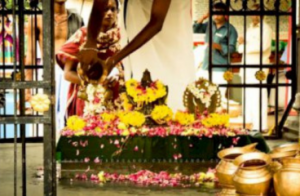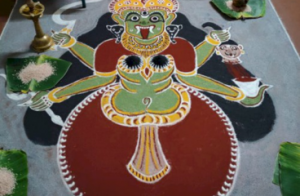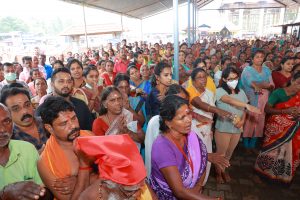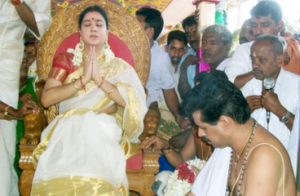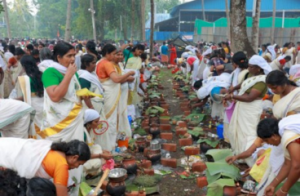PRIVACY POLICY
Terms & Conditions Privacy policy
Chakkulathukavu Trust Welcomes you,Chakkulathukavu Trust operates https://chakkulathukavutemple.org/. This page indemns you of our policies regarding the collection use and disclosure of Personal Information we receive from users of the Site.Your privacy is important to us and to protect your privacy better we have provided our online information practices and the choices you can make about the way your information is collected and used on our site
We use your Personal information only for providing and improving the Ste. By using the Site you agree to the collection and use of information in accordance with this policy
Information Collection and Use:
While using our Site. we may ask you to provide us with certain personally identifiable information that can be used to contact or identify you personally identifiable information may include. but is not limited to your name (Personal Information)
Logger Data
Like many site operators, we collect information that your browser sends whenever you visit our Site log Data’.This Log Data may include information such as your computer’s Internet Protocol (IP address browser type browser version and the pages of cur Site that you visit, the time and date of your visit. the time) spent on those pages and other statistics in addition we may use third party services such as Google Analytics that collect. monitor and analyse this Communications: We may use your Personal Information to contact you with newsletters marketing or promotional materials and other information,
Cookies:
Cookies are files with small amount of data which may include an anonymous unique identifier. Cookies are sent to your browser from a web site and stored on your computer’s hard drive.
Like many sites. we use “cookies to collect information. You can instruct your browser to refuse al cookies or to indicate when a cookie is being sent. However. if you do not accept cookies you may not be able to use some portions of our Site.
Linking to Third Party Websites:
This website contains links to other websites. Please be aware that we are not responsible for the privacy practices of such other websites. We encourage our users to be aware when they leave our website and to read the Privacy Statements of each and every website that collects Personally Identifiable Information. This Privacy Statement applies solely to information collected by this website.
Privacy
This Privacy Statement discloses the privacy practices followed by Chakkulathukavu Trust, “We” or “Us” and how it treats the information that it collects and receives, including information related to your past use of Chakkulathukavu Trust donation, products and services. This policy does not apply to the practices of companies that Chakkulathukavu Trust does not own or control or to people that Chakkulathukavu Trust does not employ or manage.
We will not knowingly use information collected on this website to others in ways different from what is disclosed in this statement. Chakkulathukavu Trust collects information from our users at several different points on our website. For purposes of this Privacy Statement, “Personally Identifiable Information” refers to information that can directly identify an individual; for example, such information may include an individual’s name, mailing address, phone number or email address.
1.1 Information that is automatically collected: We use IP addresses, with the help of a business partner, to analyze trends, administer the website, track users’ movements, and gather broad demographic information for aggregate use. IP addresses are not linked to Personally Identifiable Informatio
1.2 Information that is collected by Cookies: A cookie is a piece of data stored on a user’s hard drive containing information about that user. By setting a cookie on our website, the user would not have to log in with a password more than once, thereby saving time while on our website. If a user rejects the cookie, they may still use our website. The only drawback to this is that the user will be limited in some areas of our website.Cookies can also enable us to track and target the interests of our users to enhance the experience on our website.
1.3 Information that is actively submitted to Chakkulathukavu Trust: Registrations and Orders: In order to donate online or order services from this website, a user must create an account and complete a registration process. During the account creation process, a user must provide contact information (such as name and email address) so that we can stay in touch with our users. This information is also used to fulfil order and registration requests. To donate online or for other service ordered, a user must provide contact information (such as name and shipping address) and financial information (such as a credit card number and its expiration date). This information is used for billing purposes, with the help of our service provider (the bank which is providing us the payment gateway facilities), and to fill users’ orders. If we have trouble processing an order, this contact information is used to get in touch with the user
1.4 Third Party Advertisers on Chakkulathukavu Trust ‘s Website: Presently, we do not provide any third party advertisement on our website. No third party interference is yet allowed and hence there is no question of collecting any information from third party from our website. In future, if we allow advertisement on this website with authorized permission, we will decide on the collection of private information by third party or use of cookies by third party. The necessary information will be mentioned in this place.
1.5 Information Chakkulathukavu Trust Obtains from Third Parties: Presently website is not collecting user information from third party. Only in case of Payment Gateway, the bank (who so ever provides the payment gateway services for online transaction) collects very critical information like Credit card or debit card number, Expiry date of credit card or debit card, Credit card or debit card holders name, amount deducted from their credit or debit account and any other relevant information which is must for online transaction. These information are collected by payment gateway service provider and these information along with your contact information may stored with payment gateway service provider. Chakkulathukavu Trust stores your contact information and amount you donate or pay for various services or products. The payment gateway service provider sends the transaction number to Chakkulathukavu Trust website on completion of payment procedure along with status of transaction (like success, cancel or error).
A. On Successful transaction of payment: In case of successful transaction of payment for donation, services or product the user will inform accordingly. The details will also inform via email (if proper email address provided at the time of payment). The amount will be deducted from user’s respective bank and credited in the account of Chakkulathukavu Trust account.
B. On Cancel of transaction of payment: If user cancels the transaction in middle of the process, the details are stored in the database and transaction of record generated mentioning that user has interfered in middle of transaction and cancels the transaction. In case of cancellation of transaction, it is possible that server might have already completed transaction and user may get the report of transaction late.
In that case: If transaction is for donation cancellation of order is not possible. If transaction is for services or purchase of product then user has to enter cancellation of order procedure. This is possible by user to enter in their account by user-id and password and selecting the order which is required to be cancelled. If order is already processed (for example book is already sent or services are already enjoyed) then cancellation is not possible.
2. Communications from Chakkulathukavu Trust: Welcome Emails and General Correspondence. We send a welcoming email to the email address associated with the account a user has created to verify the users password and username. This process is designed to prevent e-mail addresses from being used without permission in the creation of a Chakkulathukavu Trust account. Established users will occasionally receive information on products, services, special deals, and a newsletter. Out of respect for the privacy of our users we present the option to not receive some of these types of communications. Please see our opt-out options below.
Site and Service Updates-
We send the user website and service announcement updates. Users are not permitted to unsubscribe from service announcements, which contain important information about the website and/or service. We may communicate with users to provide services that users request or to discuss issues relating to their account. Surveys & Contests-From time-to-time our website requests information from users via surveys or contests. Participation in these surveys or contests is completely voluntary and, as such, the user has a choice whether or not to disclose this information. Information requested may include contact information (such as name and shipping address), and demographic information (such as zip code, age level).
3. How Information Collected by Chakkulathukavu Trust is Used: Demographic Information-We will share aggregated demographic information with our partners. The aggregated demographic information is not linked to any Personally Identifiable Information that can identify any individual person. Communicating with Our Users-We use Personally Identifiable Information (such as your name, telephone number or email address) to communicate with our users when they have questions, concerns or comments about their accounts or the services that we provide. If you contact us, we may or may not delete your emails or voice mails to us. Information Shared With Third Parties-We do not share your information with third party except you provide while payment transaction to payment gateway service providers. Use a credit card processing company to bill users for goods and services. These companies do not use Personally Identifiable Information for any use other than credit card processing; however, we will not be responsible or liable for use of the information required by credit card companies in contravention of their policies, contractual obligations or general good business procedures. Partner with third parties who provide services to our users-When the user signs up for or agrees to receive a specific service provided by the third party (i.e. PostMasterDirect advertisements), we share the information that is needed for the third party to provide the services. Share your Personally Identifiable Information with other entities that are owned by Chakkulathukavu Trust that own or have some sort of corporate ownership relationship with Chakkulathukavu Trust Addressing Legal Issues-Further, we provide Personally Identifiable Information to respond to subpoenas, court orders, or legal process, or to establish or exercise our legal rights or defend against legal claims. Further, we believe it is necessary to share Personally Identifiable Information in order to investigate, prevent, or take action regarding illegal activities, suspected fraud, situations involving potential threats to the physical safety of any person, violations of Chakkulathukavu Trust ‘s terms of use, or as otherwise required by law.
4. Correction/Updating Personal Information: Users must provide accurate and correct contact information (name, postal address, e-mail address, phone number) etc. On providing wrong information if we are unable to process your request, then we are not at all responsible for the act. We provide services and product only if you provide the correct information. Due to wrong information product may not reach to your destination in time or sometime not reach at all. In that case, Chakkulathukavu Trust is not responsible and has no legal rights to provide required services or refund your amount whatsoever.
5. Opting Out: Users are provided an opportunity to “opt-out” of having their information used for purposes not directly related to the services they request. Users who no longer wish to receive our newsletter or promotional materials from us may opt-out of receiving these communications by replying and typing “unsubscribe” in the subject line in the email or email your request.
6. Use of the Chakkulathukavu Trust Website by Persons Under Age 18 years: This website is collecting payment for donation, various Pooja services and products sale. It is not intended for use by anyone under the age of eighteen (18), and any individual under such age should not provide us with Personally Identifiable Information. We do not knowingly contact, market to, solicit, collect or use Personally Identifiable Information from or about any individual under the age of 18. It is possible that by fraud or deception we may receive information pertaining to children under 18. If we are notified of that we have personal information regarding a person under the age of 18, as soon as we reasonably verify the information, we will either obtain parental consent or otherwise delete the information from the account and/or service. However, the information may remain on a log in our servers. If you want to notify us of our receipt of information by children under 18.
7. 8. Users Must Keep Their Passwords Private: Users are required to keep their account passwords confidential and do not share this information with others. If you choose to reveal or share your password and Chakkulathukavu Trust account name, we are unable to guarantee the security of your account.
9. Changes to Our Privacy Statement: This Privacy Statement may change, and use of information that we gather now is subject to the Privacy Statement that is in effect as of the time of use. You are responsible for periodically checking our Privacy Statement. You may opt-out of any posted change to our collection. If we make minor changes to this Privacy Statement, the changes will be immediately effective upon posting the revised Privacy Statement to the website. If we make material changes to this Privacy Statement or in how we will use or collect your Personally Identifiable Information, we will prominently post a notification on our website of the changed Privacy Statement ten (10) days prior to implementing the change. The date at the bottom of this Privacy Statement is the date that the Privacy Statement is effective.
Privacy Policy
This Privacy Policy applies to all of the Pooja, services, and websites offered by Chakkulathukavu Trust.
Sometimes, the Chakkulathukavu Trust may post item specific privacy notices or help Centre materials to explain Pooja/services in more details.
If you have any questions about this Privacy Policy, please feel free to contact us through our website or write to us at info@chakkulathukavutemple.org.
Website Detail:
The entire content of the website has been gathered to the best of our knowledge and belief, and the Chakkulathukavu Trust endeavours to keep it up to date. In particular, we reserve the entire right to update and/or modify and/or remove this data anytime and without any prior notice. Please note that the Chakkulathukavu Trust holds no responsibility for incorrect or no longer correct statements, quotes or descriptions and thereby excludes liability for any losses resulting from such wrong information. Further, the Chakkulathukavu Trust has every right to bring about legal action on any individual who misuses/alter/reproduce the content/ information available on the website.
Data Privacy Policy:
Our data privacy policy strictly conforms as per the regulations set down in accordance with the protection of data collected from people visiting our website. The Chakkulathukavu Trust treats all personal data obtained via the internet and our website carefully and confidentially so that no physical/mental harm is instilled upon the person, with regard to the collected data. Personal data that has possibly been known to us will be kept secret, privacy will be respected and information will be used exclusively for the purpose for which it was made known to us. Without seeking approval of the respective person, this data will neither be made accessible to third parties nor transferred to them in any form or manner.
Changes to Our Privacy Policy:
The Chakkulathukavu Trust reserves the entire right to modify/amend/remove this privacy statement anytime and without any reason. Nothing contained herein creates or is intended to create a contract/agreement between the Chakkulathukavu Trust and any user visiting the Chakkulathukavu Trust website or providing identifying information of any kind.
DND Policy:
If you wish to stop any further SMS/email alerts/contacts from our side, all you need to do is to send with your mobile numbers and you will be excluded from the alerts list.
Delivery Policy:
Pooja Booking Orders(Prasadam) with request of Prasadam are dispatched with in 15 working days after performing Pooja through Indian Speed Post Service only. Delivery of these orders will be duly done to the address as mentioned by you at the time of placing the order.
Shipping:
While we take utmost care to ensure proper delivery of the consignment we will not be responsible for any deficiency by the courier agencies for delivery of any items. No refund will be issued for any short delivery/ damaged goods/ loss of shipment or any other condition not mentioned here.
Disclaimer:
Data Security: We take utmost precautions with your data, we will never share your information. We also do not store any sensitive information like your credit card or bank details. Please Note: The Chakkulathukavu Trust offering which is made to Chakkulathukavu Trust based on the need on the ground will allocate resources to specific work that needs the funds most. Confirmed and verified by the Authority at Chakkulathukavu Trust.


